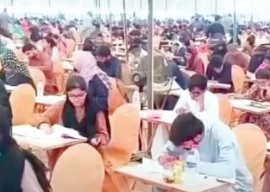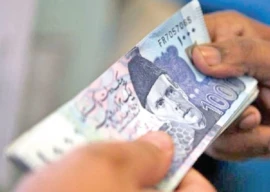
I informed the authorities who told the residents about the make-shift hospital that provided free medicines. All residents were encouraged to go to the facility. I tried to console her in my weak Sindhi.
When I had entered the camp, my co-workers and I were swarmed by children who snatched biscuits from us. Hunger does that to you.
As I talked to the women at the camp with the help of a translator, they told me that they need cooking utensils. If they are provided with rations and utensils, they can be self sufficient. After all, for how long can hundreds of thousands of people be served cooked food?
The camps were well organised. The tents were set up in the form of a circle. People in one camp were content, while those in other camps had complaints. A young woman was sitting on a charpoy with her two toddlers. She smiled when I greeted her. I asked her if she was getting everything she needed and she nodded. “I am very grateful because I am getting food, clothes and medicines,” she told me. She knew she was better off than a lot others.
In another camp, a man approached us and complained about how they did not have clean drinking water and clothes. “We have been drinking dirty water from the nearby lake and our children are getting sick,” he said. He pointed at his dirty clothes. “That’s all we have left and I have been wearing the same clothes for the past several days.” We complained to the authorities who installed a hand pump in the camp the very next morning so that people could have access to clean drinking water.
There were ups and downs in the camps. It is heartening to see the efforts being made for the flood survivors. But there is a long way to go.
Published in The Express Tribune, September 2nd, 2010.





1732176172-0/Untitled-design-(8)1732176172-0-270x192.webp)
1732175528-2/Untitled-design-(5)1732175528-2-270x192.webp)










COMMENTS (5)
Comments are moderated and generally will be posted if they are on-topic and not abusive.
For more information, please see our Comments FAQ